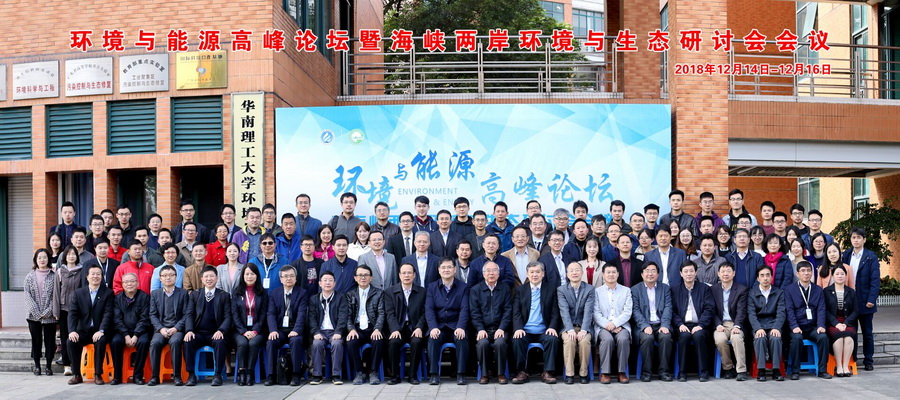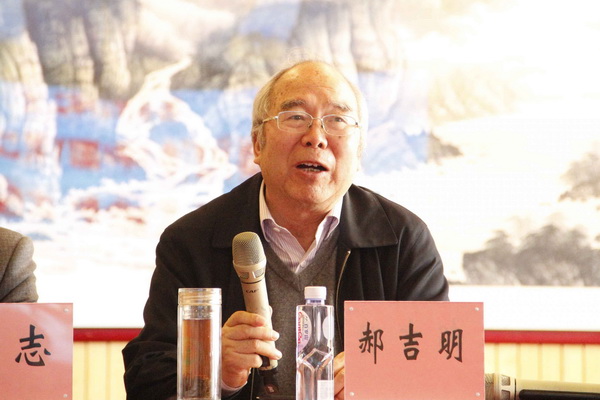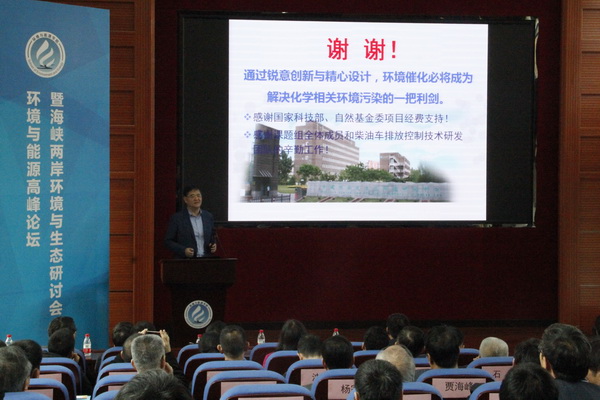

On December 14th to 16th, 2018, the Environment and Energy Summit Forum and the Cross-Strait Environmental and Ecological Seminar (hereinafter referred to as “the seminar”) was held in South China University of Technology. The seminar was to promote communications, collaborative innovation, and cooperation between government and industry in the environmental and ecological academic circles across the Taiwan Straits. The seminar also aimed at improving the academic level of environment and energy in South China University of Technology, and promoting the construction and development of the National Engineering Laboratory for Volatile Organic Pollutant Pollution Control Technologies and Equipment. The seminar was hosted by the South China University of Technology, undertook by the School of Environment and Energy of South China University of Technology, Guangzhou Energy Conservation and Environmental Protection Application Technology Exchange Promotion Association, and co-organized by Guangzhou Zhuhe Engineering Technology Co., Ltd. The forum mainly included the Conference Report, Cross-Strait Forum Reports, Environment and Energy Discipline Development Committee Meeting, National Engineering Laboratory Technical Committee for Volatile Organic Pollution Control Technology and Equipment, Government, Industry, Study and Research Forum. During the conference, nearly 100 guests of famous universities and research institutes, government and business representatives from Korea, Mainland and Taiwan, gathered at South China University of Technology to discuss the frontier issues in the fields of environment, energy, and ecology, focusing on the current environment, hot issues and difficulties in the energy and ecological fields.

On the morning of December 15, the opening ceremony of the seminar was held in the Room 215 lecture hall of the Environmental Building of South China University of Technology. Academician Hao Jiming from the Chinese Academy of Engineering and the Institute of Environmental Science and Engineering of Tsinghua University, Academician He Hong from the Chinese Academy of Engineering and the Center for Eco-Environmental Sciences of the Chinese Academy of Sciences, Vice President of South China University of Technology Qiu Xueqing and Vice President of South China University of Technology Dang Zhi, the Distinguished Professor Jiang Benji from Environmental Engineering Research Institute of Taiwan University, Distinguished Professor Luo Shanglian from the Institute of Environmental Engineering of Taiwan University, Professor Xing Baoshan from Massachusetts Institute of Technology, Professor Liu, Professor Hyunook Kim from Seoul National University, and Professor Zhang Tong of the University of Hong Kong attended the opening ceremony, as well as nearly 100 well-known experts and scholars from universities and research institutes, governments and business representatives. The opening ceremony was hosted by Prof. Ye Daiqi, Dean of the School of Environment and Energy, South China University of Technology.
During the opening ceremony, Vice President Dang Zhi delivered a welcome speech on behalf of South China University of Technology. He pointed out that South China University of Technology was building a new campus and planning to build a new ecological and environmental college, believing that through the successful convening of this forum, Cross-straits academic communications and cooperation could be further promoted, attracting the help of Taiwan compatriots and even researchers around the world and promoting the construction of the College of Ecology and Environment to a new level. Hao Jiming said at the meeting that the Cross-strait academic communications have a long history and should have a broader vision and a higher position. He pointed out that the purposes of the seminar should focus on global environmental issues, addressing the five major areas of energy, food, water, climate warming, and waste, identify research directions, and transform scientific research results to help the social development. After the opening ceremony, Academician He Hong of the Chinese Academy of Sciences gave an academic report entitled “Environmental Effects of Environmental Catalysis”. Professor Luo Shanglian from Taiwan University gave an academic Report entitled “sludge: a waste or renewable source for energy and resources recovery?”. Professor Xing Baoshan from the University of Massachusetts, USA, gave an academic report entitled “Critical role of charge-assisted H-bond in adsorption of ionizable organic compounds on carbonaceous materials”.

On the afternoon of December 15, in the three sub-forums, nearly 30 home-and-abroad experts and scholars from Tsinghua University in Taiwan, Institute of Urban Environment of Chinese Academy of Sciences, South China University of Technology, Huazhong University of Science and Technology, Xiamen University, Taiwan Yunlin University of Science and Technology, Yilan University, Seoul National University, etc., made reports on the frontier areas of the ecological environment such as water environment, climate change and atmospheric environment, ecological environment and ecological restoration, and energy environment. At the sub-conference of “the Third Meeting of the First Technical Committee of the National Engineering Laboratory of Volatile Organic Contaminant Pollution Control Technology and Equipment and Leading Development Committee Meeting of the School of Environment and Energy, South China University of Technology”, Qiu Xueqing, the Vice President of South China University of Technology delivered a speech and expressed warm welcome from SCUT to the experts and participants, hoping that under the guidance of the committee, the School of Environment and Energy would be able to make greater progress with clearer "double first-class" development goals and ideas. Professor Ye Daiqi, the Dean of the School of Environment and Energy and Professor Hu Yun reported the academic situation of the college and the construction of the national engineering laboratory. In the last discussion session, experts and scholars made suggestions for the construction of the disciplines and the national engineering laboratory. They put forward many constructive opinions and demonstrative examples on the construction of the college team, the research directions, the construction of the national platform, the cultivation of students and the reform of the system.

In the afternoon of December 16, at the Forum on Politics, Industry and Research, Professor Lin Zhang, the Associate Dean of School of Environment and Energy of SCUT, introduced the academic advantages, scientific research, and transformation of Transformation of scientific research achievements on behalf of the School. The research teams in the college made reports on the team's research progress. In the communication session, the participating units acknowledged that the high-level scientific research of the School had broad prospects for the development of Government-Industry-University-Research cooperation and were satisfied with the strategic development needs of the politics, industry research and study. In the future, all parties should strengthen cooperation and realize the connection between “production, study and research” and the market, and accelerate the pace of transformation of results.




